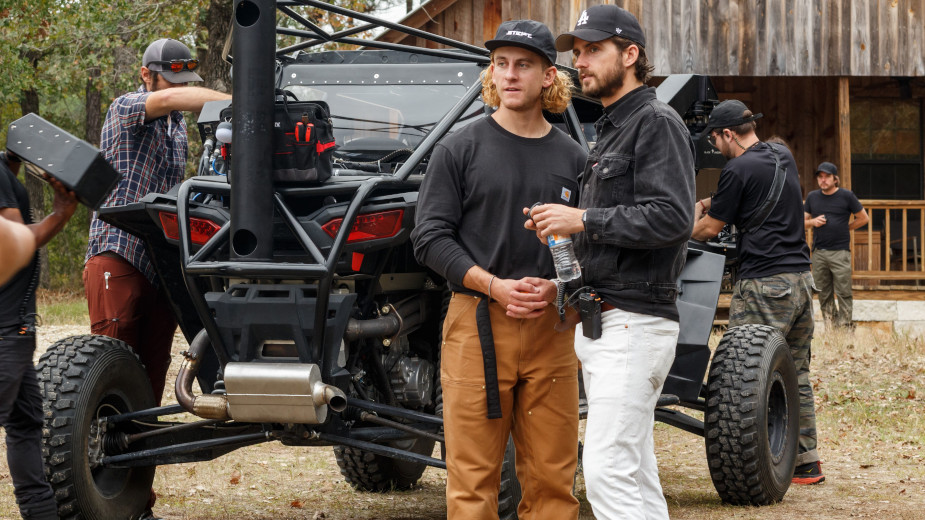
Producing Tomorrow’s Producers: Why Rob Crenson Always Jumps in with Both Feet

Rob Crenson is an award-winning commercial and narrative film producer based between Vancouver, British Columbia and Los Angeles, California. Getting his start in filmmaking with ski and snowboard movies, Rob has worked with a wide range of clients in the commercial space, including the likes of Oakley, Subaru, Corona Extra, Ford, Toyota, adidas, Patagonia and Rockstar Energy. Over a 10 year career, so far Rob has developed a strong eye for detail and an ethos that leans into solution-oriented thinking and collaborative team structures.
Authenticity and lean robust approaches are two key strategies he uses to shape all motion picture projects he works on. Rob consistently strives to achieve top-tier visual storytelling while persevering in the face of any new challenges that often come up. This is evident through his success at Cannes 2022 (in which he was awarded a Gold at the YDA awards in the commercial category), his work with talented Canadian director Sebastian Hillesbrand, and his beginning to work with industry leading teams like Stept Studios in LA, and Monsters Children in Sydney, Australia.
What advice would you give to any aspiring producers or content creators hoping to make the jump into production?
Rob> Jump two feet in and don’t look back! My first caveat with answering this question is that one thing I’ve observed about this industry, and more specifically producing, is that there is no real exact formula or defined approach to entry. Over years of producing and working with different productions, teams, and individuals, I’ve learned that everyone has their own unique path and way they came to find their niche. My simple advice to aspiring producers is to get your foot in, and try every role or job in the film industry at least once - even on set for one day (production assisting, camera department, art department, locations, post-pro, etc.). This will help you understand how the machine works, and allow you to empathise and best set up your productions for success.
Also, just work with what you’ve got, and be willing to get scrappy. Often, people think you need the higher-end cameras and lots of money - or connections - to produce good work. In reality, that’s completely untrue. That stuff helps, but ultimately, starting small gives you the building blocks for the next project, and then the next one, and then your next one… which will be the big one, right?
LBB> What skills or emerging areas would you advise aspiring producers to learn about and educate themselves about?
Rob> Two of the fundamental and basic skill sets to work on (and ideally master) are communication and teamwork. I feel this applies to most fast-paced jobs or industries, but it especially does in production, as a producer. You are only as good as your word, and the team you work with. Those two simple skill sets cannot be overlooked!
Outside of that, I’ve taken some project management courses which have helped me work through and understand different strategies on moving a project from concept all the way to final delivery - through the different stages. From an emerging area perspective, I would have to say learning more about VFX, CGI, and overall new tech applications in filmmaking is key. That world is really just getting started in the grand scheme of things, and I have noticed more integration of VFX and CGI in the commercial projects I’ve produced over the years.

LBB> What was the biggest lesson you learned when you were starting out in production - and why has that stayed with you?
Rob> If you can’t produce a $30k shoot, you certainly cannot produce a $300k or $3M project. Going back to my first answer, start with the basics. To this end, there’s something I like to call the ‘problem solving production matrix’. Essentially, it’s a three circle Venn diagram. Circle one is the most important resource, which is time. Circle two - the second most important resource - is people. The third, and certainly helpful but least important circle, is budget. If you have two of the circles available to you, the project should go well. If you only have one, you are at risk. If you have all three, well that’s the dream! The people area is major too. If you work with the right team and have the right mindset, it’s quite incredible what you can get done without the other two. I learned this from a legendary producer based in Squamish, BC, who I’ll leave unnamed, but who helped give me my start.

LBB> When it comes to broadening access to production and improving diversity and inclusion, what are your team doing to address this?
Rob> This is something top of mind when crewing up for productions. We want to have a welcoming and inclusive work environment across all areas and facets of our business. This can be addressed in so many different ways when it comes to race or marginalised communities or demographics. For example - and one that is pertinent to us - a lot of our work and clients focus on action sports. As such, we work hard to ensure we include women behind and in front of the camera. Action sports are notorious for taking the spotlight away from that demographic, and we strive to find that balance point. In doing so, we have worked specifically to showcase women’s athletic or creative stories, as well as to find opportunities for the same group.
LBB> There are young people getting into production who maybe don’t see the line between professional production and the creator economy, and that may well also be the shape of things to come. What are your thoughts about that? Is there a tension between more formalised production and the ‘creator economy’, or do the two feed into each other?
Rob> There is a difference, but there is also merit to both approaches. It all comes down to the scope of work. The line can be blurred at times, but ultimately, it comes down to who is viewing the content, what type of resources you are working with, and what style of storytelling or imagery do they best engage with. There isn't any tension, from my perspective, between formalised production and the ‘creator economy’. I’ve actually seen them work in tandem on my sets quite well. It just comes down to communication and setting expectations for the creatives, the production, and ultimately, understanding what the client or audience wants and needs.

LBB> If you compare your role to the role of the heads of TV/heads of production/ exec producers when you first joined the industry, what do you think are the most striking or interesting changes (and what surprising things have stayed the same?)
Rob> This is a wild question that could span generations of filmmakers and producers. A colleague of mine and I always wonder how the hell productions were done prior to digital spreadsheets, cellphones, and email. Everything was paper spreadsheets and budgeting, along with landlines or traditional mail! It’s quite trippy when you think about it that way.
The communication and budgeting technology producers are working with these days is super helpful, accurate, and fast. It allows us to move quicker and make educated decisions to service the client, creative, and production. I also think travelling has become easier, when compared to previous generations. These days, travel has never been easier - really. The ability to have travel carnets issued at camera houses, being able to source gear from all over the world, and the abundance of travel options to shoot in remote places has given us an ample options to execute shoots in a remote places with gear that, typically, never left the back lot in LA 30 years ago. I guess the only thing that has truly stayed the same is ‘where there is a will, there is a way’.
LBB> When it comes to educating producers how does your agency like to approach this?
Rob> Hands on and two feet deep. I appreciate and encourage experience-based learning, and it’s important to me that people know there are no dumb questions, and that there is no wrong way to get a job done. If you are not failing or making mistakes, you are not trying hard enough, or doing something truly unique or creative.

LBB> It seems that there’s an emphasis on speed and volume when it comes to content - but where is the space for up and coming producers to learn about (and learn to appreciate) craft?
Rob> Speed and volume are sometimes the name of the game, but I’ve also noticed a shift towards quality longer-form original content over the past couple years. Of course there is a place where short punchy commercials and content features are shot and distributed across various platforms or audiences, but original, more tactile, branded content is growing - which I personally find exciting. It’s true storytelling within the commercial space, and it allows more breathing room for creatives and producers.
The space to find that, ultimately, is through shooting what you want. Do it yourself with a like-minded group of individuals, and then put it out there in the world! You develop your craft, the way you want it to look and feel, and then eventually - with consistency, timing, and the right effort - you will be able to land where you need to be.
LBB> On the other side of the equation, what’s the key to retaining expertise and helping people who have been working in production for decades to develop new skills?
Rob> I think the best thing you can do to avoid burnout and creative redundancy is to work with new teams in new places. While it may become problematic if you are fixed to a specific location, if you have the ability to travel for jobs, or reposition to a new market to pursue your career, the experience and knowledge you will gain from that time will be priceless!
Everyone is doing the same thing really, but in a slightly different way. Production is everyone saying the same thing, but in different languages. For me personally, I also try to network with or shadow other producers or directors when I can. It’s helpful for me to keep it spicy and avant garde, you know?
LBB> Clearly there is so much change, but what are the personality traits and skills that will always be in demand from producers?
Rob> Being focused. Having great communication. Understanding how to be empathic with people. Having a great strategy. Being able to assess risk. And being stoic or calm when things don’t exactly go as planned. Hold on, it’s a wild ride!















